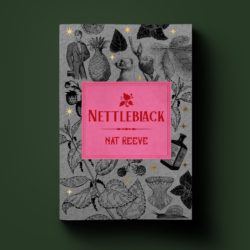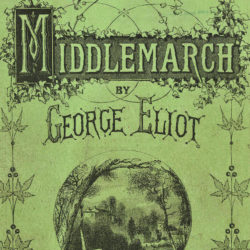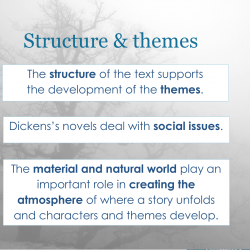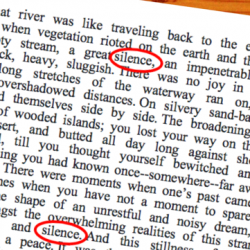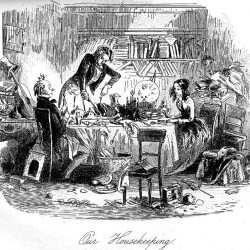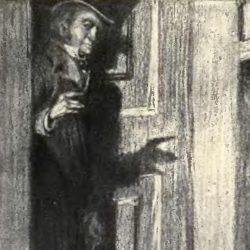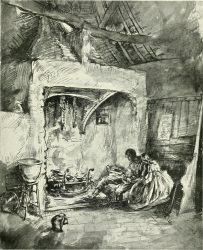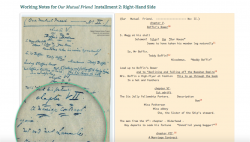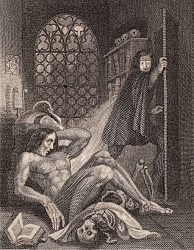Nat Reeve is a novelist and AHRC-funded PhD candidate at Royal Holloway, University of London. Their debut novel, Nettleblack, is out June 23rd 2022 with Cipher Press, with a sequel forthcoming in 2023. Nat’s PhD project is a queer reading of Elizabeth Siddal’s art and poetry, featuring unruly Books of Hours, tree-person hybrids, sapphic musicians … Continue reading “‘The Gumption I Write With’: The Chaotic Journals of (Neo)Victorian Characters”
Tag: concordances
‘I know no speck so troublesome as self’: Finding Middlemarch through Corpus Linguistics
Dr Rosalind White, (@DrRosalindWhite on Twitter) research associate at the University of Birmingham’s Centre for Corpus Research and on #FindingMiddlemarch at Royal Holloway, University of London, proposes a way into George Eliot’s Middlemarch using corpus linguistics. In this blog post, I’d like to explore how corpus linguistic tools can be used to illuminate the semantic texture of George … Continue reading “‘I know no speck so troublesome as self’: Finding Middlemarch through Corpus Linguistics”
Finding links between the structure and themes of A Christmas Carol
A Christmas Carol is a popular text choice for students in GCSE English Literature Section B (see the AQA Lead Examiner’s Report 2017). No wonder then, that it is also one of the top texts in our CLiC 2.0 web app for which teachers request activities. In fact, two teachers have previously written guest blog … Continue reading “Finding links between the structure and themes of A Christmas Carol”
“Hello darkness my old friend…”. Enacting silence through punctuation in Heart of Darkness
As suggested by the famous song by Simon and Garfunkel, darkness and silence often go together in our imagination. Conrad’s novel Heart of Darkness seems to be no exception. The to-and-fro movement from linguistic description to literary appreciation and interpretation is what traditional stylistics and modern computer stylistics have in common, along with the assumption … Continue reading ““Hello darkness my old friend…”. Enacting silence through punctuation in Heart of Darkness”
Liminality in David Copperfield
In this guest post, Sophie Phelps explores ‘liminal’ Dickensian characters who are not quite children and not quite adults, as she shows with a case study of David Copperfield’s “child-wife” Dora. We think this topic is a fantastic fit for us: questions of characterisation in Dickens’s writing are very dear to the CLiC project. Childhood is … Continue reading “Liminality in David Copperfield”
Distance-reading the feminine landscapes of The Awakening
In this guest post, Heather Froehlich, Digital Scholarship Fellow in Text Analysis and Assistant Librarian at Pennsylvania State University, shows that digital humanities is not all about big data but can also provide useful insights on a smaller scale. She demonstrates this with a case study of Kate Chopin’s novella The Awakening. One thing we digital … Continue reading “Distance-reading the feminine landscapes of The Awakening”
Signposting and gatekeeping the supernatural: Servants and doors in The Strange Case of Dr Jekyll and Mr Hyde
In this guest post teacher Claire Stoneman shares her passion for Victorian literature with a case study of servants and agency in The Strange Case of Dr Jekyll and Mr Hyde. She emphasises the role of doors in this context – reiterating the importance of doors in this novella, which our Blog readers may remember from Lorraine … Continue reading “Signposting and gatekeeping the supernatural: Servants and doors in The Strange Case of Dr Jekyll and Mr Hyde”
On Kitchens, Keywords, Key Clusters, and Concordances: Re-examining Eating and Drinking in Emily Brontë’s Wuthering Heights
Maya Sfeir (@mmsfeir on Twitter) is a Lecturer based in Beirut, Lebanon. Her research interests focus on examining and understanding the literary-linguistic interface. Her blog post was inspired by a conversation about Emily Brontë and anorexia that she had with one of the attendees of the Corpus Linguistics Summer School held at the University of … Continue reading “On Kitchens, Keywords, Key Clusters, and Concordances: Re-examining Eating and Drinking in Emily Brontë’s Wuthering Heights”
Dickens, Wooden Legs and the Dickensian Cyberspace
Emma Curry (@EmmaLCurry on Twitter) completed her PhD thesis, titled “Language and the Fragmented Body in the Novels of Charles Dickens”, in 2016 at Birkbeck, University of London. Her research interests include Dickens, nineteenth-century fiction, digital humanities, the body in literature, and the history of emotions. During her time at Birkbeck she spearheaded the ‘Our Mutual Friend Tweets‘ project, … Continue reading “Dickens, Wooden Legs and the Dickensian Cyberspace”
Revising Frankenstein with CLiC Dickens
Beth Kemp (@BethKemp on Twitter) is an English teacher, A Level examiner, teacher trainer and writer of textbooks and study guides for A Level, GCSE and KS3. She is also passionate about reading for pleasure and contemporary YA literature, finding that language and books of various kinds tend to dominate her work and her leisure. Looking … Continue reading “Revising Frankenstein with CLiC Dickens”

